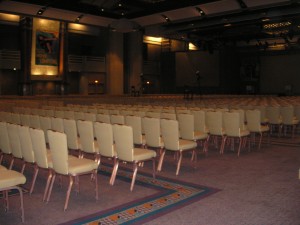
A lot of advice
Words of wisdom were being traded as often as poken high-fours at the Grace Hopper Celebration of Women in Computing, which I recently attended. Academics and professors shared their knowledge of navigating grad school; current grad students explained how not to do what they're doing; women in industry and government labs elucidated how they got there and why they enjoy their jobs.
These are a few nuggets I found to be particularly applicable. This list focuses on advice for current undergrads or early grad students -- I'll be following up soon with a list of more general advice!
-
One of the women on the Imposter Plenary Panel, Fran Berman, said, "You were not born as an undergrad, and you were not born as an intern." The skills you used to get to be an undergrad or intern will help you get to the next step, too - whether that's grad school or your first full-time job.
-
During the "How do I enjoy and succeed in grad school?" session, it was suggested that when investigating grad schools, talk to the students. Ask the students about advisors. How often do you meet? What's it like working with them, writing with them, and writing for them?
-
From the "How do I become a Researcher?" session: If you apply to grad school without knowing exactly what your focus will be, when you write your application essay, pick one thing you're interested in and write about that.. Even if that's not the only thing that interests you. You can change your mind later. The admissions folks are looking passion, interest, and focus.
-
Both the "How do I become a Researcher?" session and the "How do I enjoy and succeed in grad school?" session mentioned the following: When contacting potential grad schools, be conscious of professors' time. Professors are very busy people. Schedule meetings well in advance when visiting their schools. Show you've done your research: read their papers and ask questions about their work. You're not just finding out if these professors want you in their labs - you're finding out if you want to be in their labs! Oh, and if you send your resume to a professor, send it plain text, not as an attachment.
-
Erika Shehan Poole, during the "How do I enjoy and succeed in grad school?" session, suggested that students keep a research journal. Any ideas you have, good or bad - write them down. Questions you have. Later on, when you're planning your thesis (or any other time you need ideas), you can look back. Maybe there's a theme. Maybe some of those idea - even if they sounded dumb at the time - are actually good. Maybe they'll spark new ideas.
-
Duy-Loan T. Le, Thursday's keynote speaker, told all the students in the audience, "If you want to be the top of your class, don't fall in love." This speaks, I think, to the notion that time is finite. You cannot put all your time and energy into your coursework if you also want to put some time and energy into your relationships with the people you care about. As I've oft been told, it's a matter of balance.




